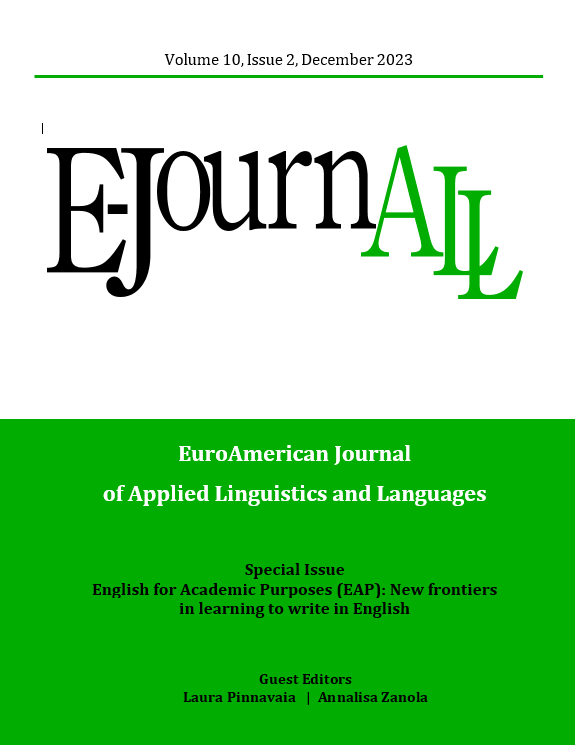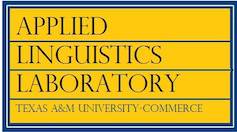Writing with “Academic Style”: theoretical considerations and preliminary findings on the new frontiers of EAP
DOI:
https://doi.org/10.21283/2376905X.1.10.2.2757Keywords:
academic style proofreading, EAP, Stylistics, error analysis, academic writingAbstract
Research in English for Academic Purposes (EAP) has increased in in terms of teaching and learning forms, methods and materials over the past decades. The globalisation of knowledge sharing and communication within the academic community, and the inclusion of marginalised higher education and research institutions, has resulted in an ongoing evolution of many terms related to EAP. Nevertheless, underexplored areas of EAP research and practice remain, including that of “academic style”, a necessary integration of EAP and academic writing teaching and practice. The study then presents a pilot study consisting in the detailed qualitative analysis of a collection of abstracts from a PhD seminar on academic style (self)proofreading. By employing a methodological framework uniting stylistics, error analysis, and the categorisation of specific areas of interest, the pilot study highlights relevant stylistic errors in academic writing and draws conclusions on the requirements and implications of introducing academic style to EAP.
References
Allen, John Patrick Brierley, & Corder, Stephen Pit (Eds.) (1974). Techniques in applied linguistics. Oxford University Press.
Amiri, Fatemeh, & Puteh, Marlia (2017). ‘Error analysis in academic writing: A Case of international postgraduate students in Malaysia’, Advances in Language and Literary Studies, 8(4), 141-145. http://doi.org/10.7575/aiac.alls.v.8n.4p.141
Barroso, Julie, Sandelowski, Margarete, & Voils, Corinne I. (2006). Research results have expiration dates: ensuring timely systematic reviews, Journal of Evaluation in Clinical Practice, 12(4), 454-462. http://doi.org/10.1111/j.1365-2753.2006.00729.x
Belcher, Diane D. (2007). Seeking acceptance in an English-only research world, Journal of Second Language Writing, 16(1), 1-22. https://doi.org/10.1016/j.jslw.2006.12.001
Bennet, Karen (2014). The semiperiphery of academic writing: Discourses, communities, and practices. Palgrave Macmillan.
Bortolus, Alejandro (2012). Running like Alice and losing good ideas: On the quasi-compulsive use of English by non-native English speaking scientists, Ambio, 41, 769-72. https://doi.org/10.1007/s13280-012-0339-5.
Bourdieu, Pierre, Passeron, Jean-Claude, & de Saint-Martin, Monique (1994). Academic discourse: linguistic misunderstanding and professional power. Polity.
Brown, H. Douglas (2000). Principles of Language Learning and Teaching, 4th edition. Pearson Education.
Burke, Michael (2014). The Routledge handbook of stylistics. Routledge.
Canagarajah, Suresh (2015). Clarifying the relationship between translingual practice and L2 writing: Addressing learner identities, Applied Linguistics Review, 6(4), 415–440. https://doi.org/10.1515/applirev-2015-0020
Cargill, Margaret Ann, & Burgess, Sally (2008). Introduction to the special issue: English for research purposes, Journal of English for academic purposes, 7(2), 75-6. https://doi.org/10.1016/j.jeap.2008.02.006
Clyne, Michael G. (1993). ‘Pragmatik, Textstruktur und kulturelle Werte: Eine interkulturelle Perspektive: Forum für Fachsprachenforschung’. In H. Schröder (Eds.), Fachtextpragmatik, (pp. 3-18). Gunter Narr Verlag.
Coolidge, Archibald Cary (1932). Archibald Cary Coolidge: Life and letters. Houghton Mifflin Company.
Corder, Stephen Pit (1981). Error analysis and interlanguage. Oxford University Press.
Crystal, David, & Davy, Derek (1969). Investigating English Style. Longman.
Doerr, Roxanne B. (2023). Academic Style Proofreading: An Introduction (Contemporary studies in descriptive linguistics, vol. 54). Peter Lang Group AG.
Englander, Karen, & Cocoran, James N. (2019). English for research publication purposes: Critical plurilingual pedagogies. Routledge.
Flowerdew, John, & Habibie, Pejman (2022). Introducing English for Research Publication Purposes. Routledge.
Galtung, Johan (1981). Structure, culture, and intellectual style: An essay comparing saxonic, teutonic, gallic and nipponic approaches, Social Science Information, 20(6), 817-856. https://doi.org/10.1177/053901848102000601
Hayot, Eric (2014). The Elements of Academic Style: Writing for the Humanities. Colombia University Press.
Holliday, Adrian (2005). The Struggle to Teach English as an International Language. Oxford University Press.
Hopkins, Diana & Reid, Tom (2018). The Academic Skills Handbook: Your Guide to Success in Writing, Thinking, and Communicating at University. Sage Publications Ltd.
Huhta, Marjatta Vogt, Karin, Johnson, Esko, Tulkki, Heikki. (2013). Needs Analysis for Language Course Design: A holistic approach to ESA. Cambridge University Press.
James, Carl (1998). Errors in Language Learning and Use: Exploring Error Analysis. Routledge.
Jeffries, Lesley, & McIntyre, Daniel (2010). Stylistics. Cambridge University Press.
Johnson, R. Burke & Christensen, Larry (2000). Educational research quantitative, qualitative, and mixed approaches. Pearson Education.
Kaplan, Robert B. (1980). Cultural thought patterns in intercultural education. In K. Croft (Ed.), Readings on English as a Second Language, (pp. 399– 418). Little, Brown and Company.
Kapp, Chris A., Albertyn, Ruth M., & Frick, B. Liezel (2011). Writing for publication: An intervention to overcome barriers to scholarly writing, South African Journal of Higher Education, 25(4), 741–759.
Luo, Na & Hyland, Ken (2019). ’I won’t publish in Chinese now’: Publishing, translation and the non-English-speaking academic, Journal of English for Academic Purposes, 39, 37-47. DOI: https://doi.org/10.1016/j.jeap.2019.03.003
McIntyre, Daniel, & Walker, Brian (2019). Corpus stylistics: Theory and Practice. Edinburgh University Press.
McKinley, Jim & Rose, Heath (2018). Conceptualizations of language errors, standards, norms and nativeness in English for research publication purposes: An Aaalysis of journal submission guidelines, Journal of Second Language Writing, 42, 1– 11. https://doi.org/10.1016/j.jslw.2018.07.003
Richards, Jack C., & Schmidt, Richard (2010). Longman dictionary of language teaching & applied linguistics, 4th edition. Pearson Longman.
Simpson, Paul (2004). Stylistics: A resource book for students. Routledge.
Solly, Martin (2016). The Stylistics of professional discourse. Edinburgh University Press.
Sorlin, Sandrine (2014). “The ‘interdisciplinarity’ of stylistics”, Topics in Linguistics 14. DOI: https://doi.org/10.2478/topling-2014-0008
Sorlin, Sandrine (2018). “La stylistique anglaise comme Carrefour de l’anglistique”, Études de stylistique anglaise 12: 7-35. DOI: https://doi.org/10.4000/esa.407
Sword, Helen (2012). Stylish wcademic writing. Harvard University Press.
Tusting, Karin, McCulloch, Sharon, Bhatt, Ibrar, Hamilton, Mary, & Barton, David (2019). Academics Writing: The Dynamics of Knowledge Creation. Routledge.
Vines, Timothy H., Albert, Aarianne Y. K., Andrew, Rose L., Débarre, Florence, Bock, Dan G., Franklin, Michelle T., Gilbert, Kimberly J., Moore, Jean-Sébastien, Renaut, Sébastien, & Rennison, Diana J. (2014). The availability of research data declines rapidly with article age, Current Biology, 24 (1), 94-7. DOI: https://doi.org/10.1016/j.cub.2013.11.014
Welsh, John, Lu, Yuan, Dhruva, Sanket S., Bikdeli, Behnood, Desai, Nihar R., Benchetrit, Liliya, Zimmerman, Chloe O., Mu, Lin, Ross, Joseph S., & Krumholz, Harlan M. (2018). ‘Age of Data at the Time of Publication of Contemporary Clinical Trials’, JAMA Network Open, 1 (4), https://doi.org/10.1001/ jamanetworkopen.2018.1065
Zanola, Annalisa (2023). La Lingua Inglese per la Comunicazione Scientifica e Professionale. Rome: Carocci Editore.
Downloads
Published
How to Cite
Issue
Section
Categories
License
Copyright (c) 2023 Roxanne Barbara Doerr

This work is licensed under a Creative Commons Attribution 4.0 International License.


